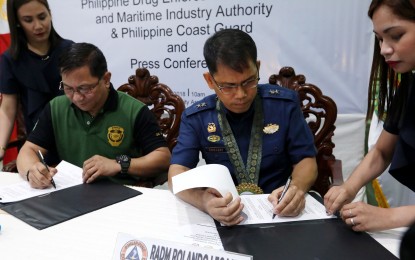News
PDEA, MARINA, PCG ink deal to stop drug smuggling in PH coastlines

“Another milestone in the history of the PDEA unfolds today as witnessed by the merging of resources and efforts of three national entities in fighting the illegal drug trade,” PDEA Director General Aaron Aquino said during the ceremony at the PDEA Headquarters in Quezon City. (PNA photo)
MANILA — The Philippine Drug Enforcement Agency (PDEA), Maritime Industry Authority (MARINA) and Philippine Coast Guard (PCG) on Wednesday signed a Memorandum of Agreement (MOA), which sealed their partnership to stop drug smuggling through the country’s coastlines.
“Another milestone in the history of the PDEA unfolds today as witnessed by the merging of resources and efforts of three national entities in fighting the illegal drug trade,” PDEA Director General Aaron Aquino said during the ceremony at the PDEA Headquarters in Quezon City.
The signatories to the MOA were Aquino, MARINA Administrator Rey Leonardo Guerrero and PCG Commandant Rear Admiral Rolando Legaspi.
“We have been witnesses on the capability of the international drug traders to penetrate countries around the world- selling their illicit products and destroying people’s lives. The international illegal drug trafficking is one of the most funded business today and we are up against the most notorious and hardcore players in this menace,” Aquino told reporters.
“This partnership with the MARINA and PCG is one strong step towards the realization of this goal. We will continue to work together until we have ensured that our country is drug-free. Much is expected of us and we must not fail in this fight,” he noted.
According to Aquino, the agreement provides a tactical and administrative cooperation between the agencies in fighting illegal drug trafficking and preventing illegal substances from entering our ports.
Under the MOA, PDEA agents will be trained and deputized by MARINA to board and inspects private vessels.
PCG will likewise deputize PDEA agents to join their agency in inspecting merchant vessels.
“This endeavor will enable PDEA to monitor activities at the ports and will empower our agents to be more pro-active in intercepting smuggled drugs. This MOA is one of the many firsts in PDEA since we assumed office last year,” the PDEA Chief said.
Aquino said that they also started training PDEA personnel in manning X-ray machines, adding that they will be assigning PDEA agents in cargo X-rays to monitor and prevent the entry of illegal drugs.
He noted that they also started the procurement of some 100 Narcotics Detention Dogs or drug sniffing dogs to be deployed in airports and seaports all over the country.
“We believe that we can only fight this multi-billion illegal drug industry by building a fortress of systems that equip our law enforcers in all fronts. PDEA is keen in preventing illegal drug trafficking and the entry of illegal drug substances in our seaports and airports,” he stressed.
MARINA is under the Department of Transportation (DOTr), which is responsible for integrating the development, promotion and regulation of the maritime industry in the Philippines.
“Intelligence reports indicated that drug trafficking organizations (DTOs) can ship tons of methamphetamine hychloride, or shabu, and its chemical ingredients into the country either through shipside smuggling in the high seas and seaports,” Aquino noted.
DTOs found the Philippines as a possible market and transshipment point for shabu and other illegal drugs because of the country’s vulnerability, particularly its porous borders and vast coastlines, which are factors in the undetected movement of illegal drugs through shipment.
The PCG is an armed and uniformed service attached to the Department of Transportation (DOTr) to enforce regulations in accordance with all relevant maritime international conventions, treaties or instruments and national laws for the promotion of safety of life property at sea within the maritime jurisdiction of the Philippines, and conduct port state control implementation.
“A more resolute and efficient maritime coastal monitoring should help prevent our waters from becoming transit and dropping points for large volumes of illegal drugs,” the PDEA chief said.
According to the country’s census, with 7,107 islands, the Philippines has one of the longest coastlines in the world which stretches 36,289 kilometers. It extends 2,000 kilometers from Batanes to Jolo encompassing 25 major cities located on the coast. It is also estimated that more than 60 percent of the Philippine population lives along the coast.
To curb drug smuggling through the ports and high seas, PDEA has established seaport interdiction units assigned in 13 key seaports nationwide, and has recently entered into agreements with the Philippine Ports Authority (PPA), PCG and MARINA which empowered the inspection of all maritime transportation in the country’s 1,200 private seaports.
“Now, all bases are covered. The PDEA’s collaboration and cooperation with these institutions enhance further the efficacy to seal off our waters from illegal drugs,” the PDEA chief said





















